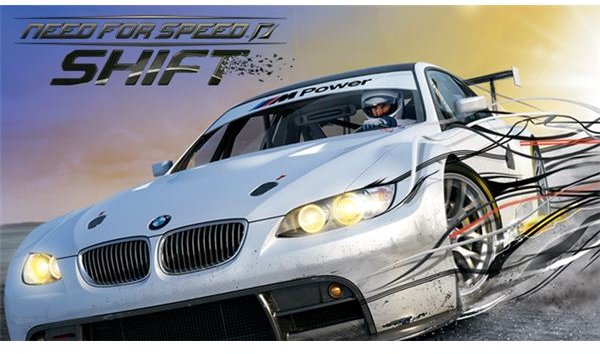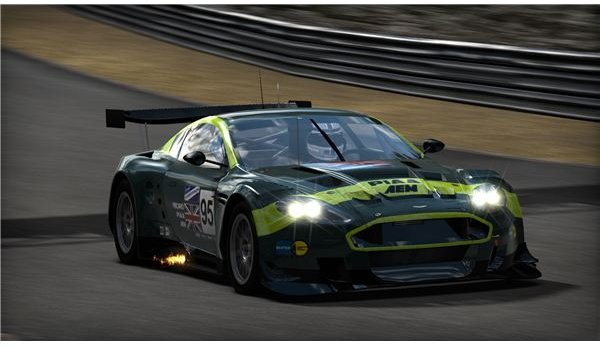Need for Speed: Shift PC Game Review - Shift Fails to Make the Shift to Realism

Resurrection
Need for Speed. The franchise is one of gaming’s oldest. The first Need for Speed was released in 1994. It was a serious simulation game - or at least as serious as hardware of the time would allow - featuring nine cars with realistic physics and sounds. That was a fairly large stable for a game of that era, and Need for Speed was critically loved for its surprisingly accurate reproduction of racing. Over the years, however, Need for Speed became less about realistic gaming or the love of cars and more about far-fetched arcade antics. I loved Need for Speed 2, but its inclusion of vehicles which were nothing more than imaginative prototypes, such as the Ford Indigo concept car, were indicative of the course the series would take in the future.
That course eventually lead to a dead end. Need for Speed couldn’t offer car lovers an experience that matched Forza or Gran Turismo, nor could it offer arcade antics as exciting as the Burnout franchise. EA wasn’t quite ready to let Need for Speed die, however, and has instead resurrected it under the guidance of Slightly Mad Studios. Calling itself a hardcore sim, Need for Speed: Shift focuses on racing on tracks, not streets, and places an emphasis on physics rather than flash. That also means it has to compete with some of the best racing games ever made - no small challenge for a franchise reboot.
Realism (3 out of 5)
The difference between Need for Speed: Shift and the previous games in the franchise is instantly noticeable. For many players, the differences will come at the first corner. Where previous games were about drifting at absurd speeds, the physics of Shift are much more in tune with reality. That means trying to go around a corner at speed will, eventually, result in understeer, followed shortly by a face full of concrete barrier.
Shift tries to ease players into the experience using a tutorial lap, during which the player can get a handle on, well, the handling. After the lap, the game will automatically assign a skill level based on the player’s performance. It’s a great idea, but as with other games that have used the concept, it isn’t very accurate. Racing a car around an unknown track with an unknown physics engine is bound to result in a few mistakes, and as a result the automatic settings are far too easy. They’re easily fixed by opening the options menu, but that defeats the purpose.
Getting into Shift is easy. The first tier cars are difficult to crash, and the first tier tracks are fairly simple. What becomes quickly obvious, however, is that EA has been conducting a little false advertising. There is no question that Shift is more realistic that previous Need for Speed games, but it is still an arcade game at heart. Besides taking first place, the game also places an emphasis on an arbitrary experience system. Players can gain points for all sorts of things, but their very inclusion makes it obvious that while Shift does include a somewhat realistic physics engine, the arcade elements are noticeable if not dominant.
The lame damage modeling drives this point home. On one early track I over-cooked a turn badly and crashed into the barrier at 80 miles per hour. I thought I was done for, as I had simulation damage turned on. In fact, the concrete encounter left me with a few scratches. This can become absurd at times, as there are certain turns on certain tracks where it is actually quicker to run into the wall full-speed and bounce off than to try and take the turn properly. Simulation? I don’t think so.
Gameplay (3 out of 5)
While Need for Speed: Shift is considered a re-boot of the series, gamers will still find a lot of the old Need for Speed flair. Shift considers itself hardcore, and by-golly, it wants you to know it. The game’s interface feels like a rave hosted in a spreadsheet. Every functional action is backed up with over-blown sounds, flashes of color, and other such ceremonial devices. Racing is no different, as the game’s previously mentioned driver experience system awards points so liberally that the player could probably gain experience just for passing gas. Even crashing into other cars results in points for aggression.
All of this flash does have a point. A racer doesn’t have to be realistic to be fun, but it does help, as those games which forgo realism can become rather absurd once the player starts to see the holes in the physics engine. Shift, then, is about trying to ground arcade gameplay in the real world, giving players the chance to enjoy their favorite cars in an environment which is constantly rewarding. I love Forza, but I must admit that it can be extremely frustrating for new-comers, even with the assists on.
Still, Shift is missing something. It could be the cars. Shift’s roster of 72 vehicles is gigantic compared to the 9 cars of the original Need for Speed, but it feels tiny compared to games like Forza and Gran Turismo. Shift also isolates the player substantially from the cars themselves by offering an overly simplified system of upgrades. There is a generic parts list of turbos and brakes and exhausts which can be added to cars, and this list doesn’t seem to vary much between vehicles. Or maybe it is the physics themselves, which can make life difficult but never give the cars a real sense of weight. Or perhaps it is the poorly thought out multi-player modes which focus more on demolition than racing.
Whatever it is, Shift is lacking. That’s not to say it can’t be fun. It often is. But it is ultimately a game with identify crisis, and that crisis is the elephant in the M3. Always in the passenger seat, impossible to ignore.
Presentation (4 out of 5)

Shift is deafening. Its default level of volume is 11, and only goes up from there. I had to turn the volume noticeably lower when playing Shift than when playing any other game in my library. Yet I can’t begrudge Shift it’s audio antics because Shift is a beautiful game is listen to. The exhaust notes of the cars in Shift have a raw edge to them which sits on the border between beautiful and unbearable. There is no mistaking the sound of a car at six or seven thousand RPM, nor is there any mistaking the four-banger in a Miata with the 8 cylinder in a Shelby Mustang.
The graphics are equally vivid. Many of the tracks are replicas of real racing circuits, but there is a bit of zest added to them. Blimps and planes commonly cruise the sky, and spectators are everywhere. The cars look stunning, but that’s nothing compared to the intricately detailed cockpit view. Each and every car allows the player the option of sitting in the driver’s seat and using the car’s real instruments rather than the virtual ones normally relied upon. It’s an amazing technical achievement, but it is also a reminder that Shift isn’t the sim it really should have been. Particularly so when the beautiful cockpit blurs as you speed up. If it lost focus, implying you are looking far up the road, it would be a great feature for a sim. Unfortunately, the blur effect feels more like an Aston Martin hurtling through hyper-space than a sweeping right-hander.
Verdict (3 out of 5)
After playing Shift for many hours, it strikes me as odd that this game is a product of Electronic Arts. It feels like a game made with a limited budget by a small but talented outfit. It can be a fun game, and at rare moments where everything clicks it can be an extremely good game. Yet it constantly falls short. The physics are decent, but easily outclassed by real sims. The arcade elements are decent, but they’re too easy and don’t add to the driving experience. There aren’t enough cars, the vinyl editor is too limited, and the multi-player feels tacked on.
Still, Shift isn’t a failure. It is successful as a reboot. There is something to this style of driving game, and I think that given time it could result in some extremely good racing games. For now, however, Shift is simply a distraction for those waiting for the release of Forza 3 or Gran Turismo 5.
